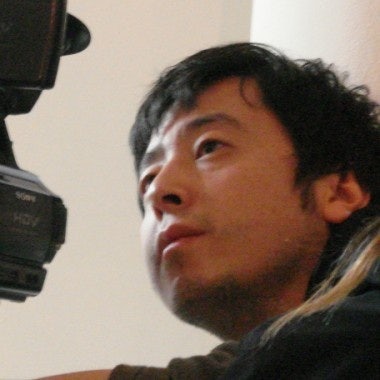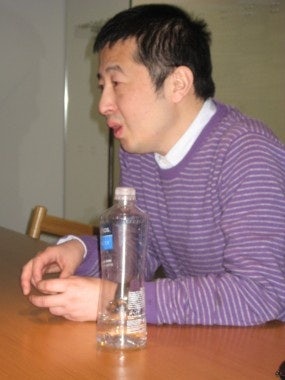In New York City for his Retrospective at MoMA, Noted Sixth Generation Filmmaker Discusses State Of Chinese Cinema, Future Plans#
#

This month, New York’s Museum of Modern Art (MoMA) is presenting a full retrospective of acclaimed Sixth Generation Chinese filmmaker Jia Zhangke. Running through March 20, the series opened this past Friday (March 5) with a screening of Shi Jie (The World), introduced by the director himself. Over the next three days, Jia introduced films at five more screenings, which were also attended by Zhao Tao, Jia’s leading actress since Platform (2000).
On Monday, March 8, MoMA presented “An Evening with Jia Zhangke.” In addition to introducing two short films (Ten Years and Black Breakfast) and a mini-preview of his upcoming work, Shanghai Legend (I Wish I Knew), the director took part in an hour-long conversation with Howard Feinstein, critic and programmer of The Sarajevo Film Festival, and Kevin B. Lee, critic, programmer, and production executive of dGenerate Films.
The Jing Daily team was on hand for the sold-out event, and conducted an exclusive interview with Jia Zhangke, which will be posted in two parts beginning Wednesday, March 17.
Jia is one of China's most celebrated filmmakers, having begun his career in the early 1990s at the Beijing Film Academy. Gaining international attention with his first feature, the shoestring independent production Xiao Wu (Pickpocket, 1995), Jia went on to complete two more “underground” features, Platform (2000) and Unknown Pleasures (2002). He then became an “official”—if still independent-minded—filmmaker with Shi Jie (The World) in 2004. More recently, Jia has been acclaimed for films like Er Shi Si Cheng Ji (24 City, 2008), which combine documentary and fiction in a surprisingly resonant hybrid form.

In his work to date, the gritty reality of life in contemporary China has been a constant focus for Jia—a fact noted by MoMA film curator Jytte Jensen, organizer of the retrospective, who characterized his work as “instrumental in depicting the human repercussions of the historical changes of his country...in an original cinematic language.”
The conversation among Jia, Feinstein, and Lee touched on topics ranging from the director’s leading actress, Zhao Tao (whom Jia praised for her ability to turn everyday movement into a kind of dance), to why Jia continues to work within the official Chinese film industry. Citing his early experience in making The World, he confessed to having worried at the time if he’d be able to express himself honestly. But, he said, speaking through an interpreter, “I hope in the films I’ve made since, it’s clear that I didn’t compromise my vision or my aesthetics” to maintain his “official” status. “It’s very time-consuming to work with censorship,” he commented. “But the system should continue to be challenged. That’s one reason I stay in the system.”
Jia is also interested in helping other independent filmmakers; to that end, he has established a production company, XStream, that develops projects with investors in China and elsewhere. “We need an independent film industry,” he said, “so that filmmakers have more room to be creative without worrying about funding or distribution.”
Asked about the hybrid documentary/fiction style he developed in 24 City, Jia said: “I started the whole project as a documentary. There are six actual workers in the film, then fictional parts played by actors. The more I tried to capture reality, the more I realized I had to use fiction. I used well-known actors—Joan Chen, Zhao Tao—so viewers could recognize when we were in the fictional part.” One reason he likes to work with non-professionals, he said, has to do with language. “These are people who can use the most natural dialects. For a long time in the Chinese film industry, there were no dialects permitted—you could only speak Mandarin. I don’t think Mandarin is as moving as dialect. For many people it’s the mother tongue. You can be more natural, more nuanced, when you use dialects.”
For more on upcoming screenings of Jia Zhangke’s films,#
check MoMA's website#
.
Be sure to come back to Jing Daily next Wednesday for the first part of our exclusive interview with Jia Zhangke, where he discusses the current state of filmmaking in China, his current and upcoming projects -- including his first martial arts film and a rumored project with Jackie Chan -- and his thoughts about operating both as an independent artist and a part of the Chinese official film system.